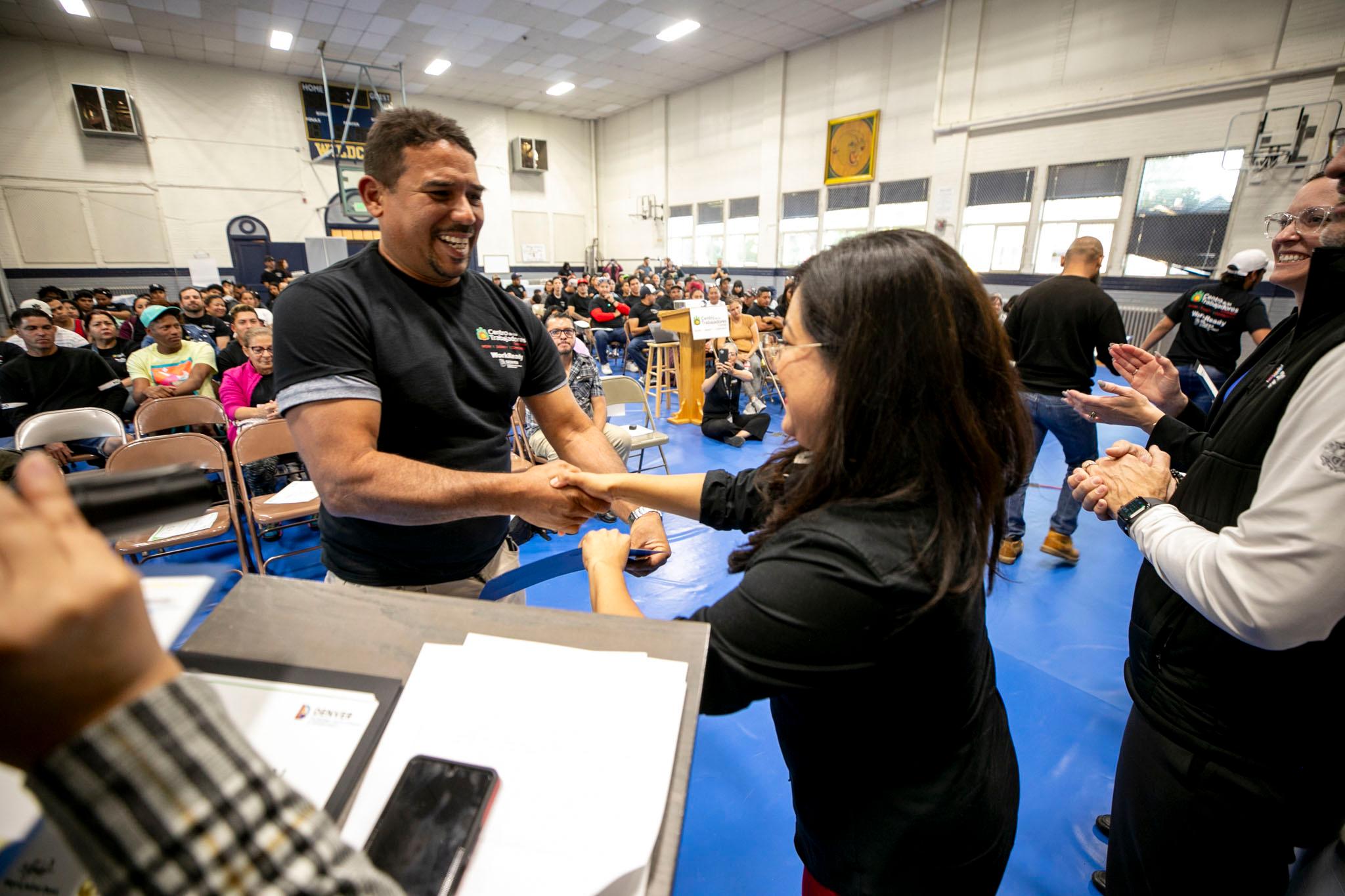The quiet gymnasium of St. Catherine’s Church was filled with echoes of applause and excited laughter Tuesday afternoon as children, partners and spouses gathered to celebrate the success of loved ones enrolled in Denver’s WorkReady program.
Jon Ewing, a spokesperson for Mayor Mike Johnston’s office, said WorkReady is a part of the Denver Asylum Seeker’s Program or DASP, the city’s larger effort that began in April to help new immigrants successfully integrate into local communities. The DASP program currently serves more than 800 men, women and children and is funded by the city.
“We have folks here who are electricians. We have folks here who ran businesses. They know how to do these things, but… there are many barriers that are standing in their way to a successful life here,” Ewing said. “We wanted to try to eliminate a few of those.”
The program operates in several phases, teaching participants English, computer literacy, the nuances of American working culture and on-the-job training. It’s designed specifically to support people looking to work in fields like construction, childcare, health care and hospitality – all industries where the state lacks employees.
Local organization Centro de los Trabajadores is working with the mayor’s office to help connect participants with jobs once their work permits are finalized through a process coordinated by DASP.
“Really, what they want [to know] is, how do I give a better life to my children?” said Myra Juárez-Denis, executive director for Centro de los Trabajadores. “We are juggling many obstacles here and there about the timing of the work permit, the housing, all of those different things that affect them. But they're very resilient. And that's why we are here. To figure out how we are going to do it together.”

The ceremony Tuesday honored students with perfect attendance throughout the WorkReady program, which officially began in July.
Denver Mayor Mike Johnson spoke to the participants in Spanish via video, congratulating them and their families for getting one step closer to achieving their goals. Sara Plastino, the director of Denver’s newcomer program, echoed the mayor’s remarks in English.
“It really is a visible manifestation of the good that migrants bring to our communities, and we're very thankful to have such wonderful newcomers in Denver,” Plastino said.
Plastino added that supporting asylum seekers with this kind of local initiative is important because there is no government-mandated resettlement program for them like there is for people who enter the country as refugees.
“We really do need to support these folks, especially because they are mandated to wait at least six months to obtain work authorization,” she said. “So, rather than viewing this period as a challenge, which of course it is, we're also viewing it as an opportunity and trying to utilize that time in a very strategic way for the individuals themselves and also for the community.”
Many in the current WorkReady class arrived in the city last spring on buses from Texas after traveling thousands of grueling and dangerous miles by foot from Mexico, Guatemala and Venezuela. They came seeking asylum and better opportunities.

Ángel Eduardo Tovar García said he traveled to Colorado from Venezuela with his brother, Gabriel Ricardo Tovar García, and their families. They are both participating in the program with the goal of beginning careers in construction once the government approves their work permits.
“When we first arrived in Denver, we thought the help we were going to get was just going to be a shelter, we never really expected the kind of program that is WorkReady. I feel super grateful to be a part of it,” Eduardo said through translator Anna Vaine, a case manager for Centro de los Trabajadores.
Now that participants like the Tovar Garcia brothers have completed the first three months of the WorkReady program, which consists of 20 hours a week of courses, they will enter phase two. That section is focused on industry-specific training. Once that phase wraps up, many students should have received work authorization.
“Honestly it means a lot that we get to celebrate the things we have accomplished and the effort we have put in. We put a lot forward and I feel grateful for the program. I want to continue with the classes because I’m enjoying them and they are super important for success here,” Gabriel said.
The brothers are among the 300 asylum seekers in the current WorkReady class. By participating, they each qualify their entire family for DASP support on things like housing and transportation while they await their work permits.

“This is preventing women and children from homelessness,” said Ewing. “On another level, it just makes good business sense.
Tony Anderson, the Chief Workforce Development Officer for Denver Economic Development and Opportunity, said the program is mutually beneficial for participants and the city as it seeks to fill hundreds of open positions in sectors the program is built to serve.
“I would say it's equally as exciting, if not more for the economic development of the region to introduce hundreds of new workers that would not have existed six months ago as folks approach work authorization,” Anderson said.
According to the United States Chamber of Commerce, Colorado has just 52 workers available for every 100 jobs. Mayor Johnston’s office said once the 300 participants graduate from WorkReady this winter, they’ll make a positive impact on that deficit.
“You have a willing workforce and you have employers who would love to hire them. It’s just common sense on our end,” Ewing said.
Organizers said people can help support participants in the program by donating to Centro de los Trajabadores.













